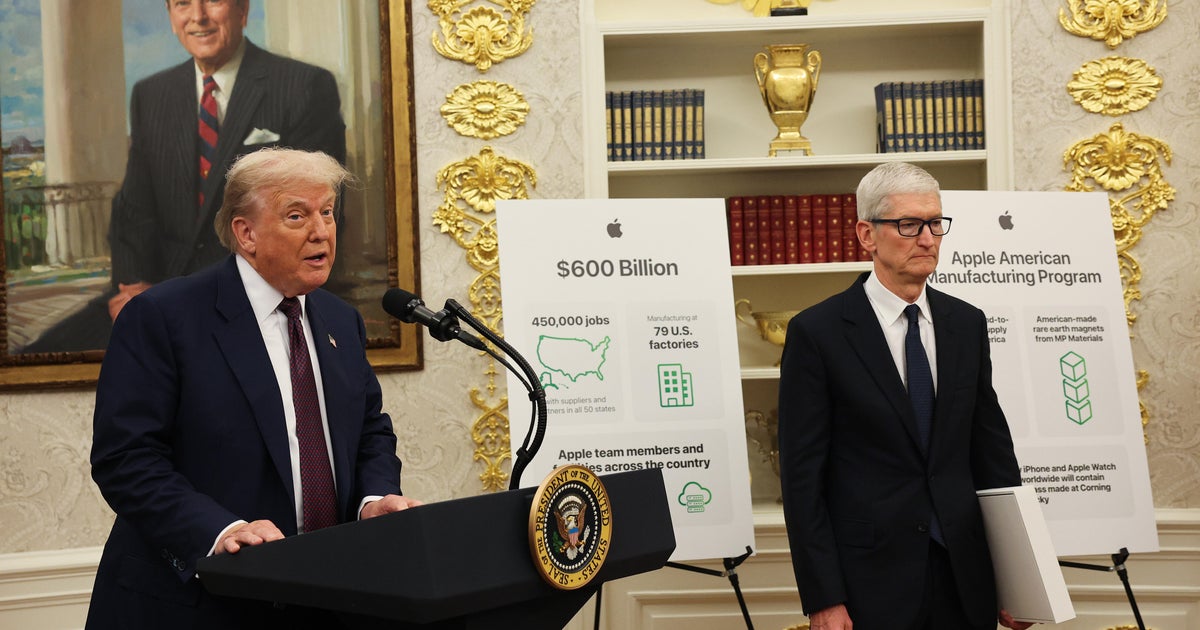In a significant development in the arena of U.S. manufacturing, President Trump stood alongside Apple CEO Tim Cook to announce an unprecedented $100 billion increase in Apple’s investment commitment in the United States. This initiative, stretching over the next four years, brings the total commitment of the tech giant to a staggering $600 billion, illustrating a firm endorsement of America’s manufacturing sector and economic future.
The announcement, made on a sunny Wednesday afternoon in Washington, D.C., not only emboldens the existing trajectory of U.S. manufacturing capabilities but also underlines a significant boost in job creation and technological advancements. President Trump was vibrant in his detailing of the investment, stating, “Today, Apple is announcing it will invest $600 billion…in the U.S. over the next four years. That’s $100 billion more than they were originally going to invest. And this is the largest investment Apple has ever made in America.”
This investment plan, far from being a mere injection of capital, is set to create 20,000 new jobs at Apple. It promises an exciting venture into smart glass technology with plans to establish a manufacturing line in Kentucky dedicated to this innovative tech. Moreover, the agenda includes the construction of a server manufacturing facility in Houston and the launch of several data centers across the nation. These facilities are not just infrastructural enhancements but are poised as pivotal centers that will support the technological backbone of the country, especially in areas such as AI and cloud-computing services.
In a move that resonates deeply with the themes of workforce development and skill enhancement, Apple also intends to inaugurate a Manufacturing Academy in Detroit. This institution will focus on equipping future workers with the necessary skills needed in an increasingly tech-oriented manufacturing sector, merging traditional manufacturing prowess with cutting-edge technology.
Adding a unique touch to the ceremony was the presentation of a delicate artifact by Tim Cook to President Trump – a glass Apple plate elegantly engraved and set in a 24K gold base, symbolizing the golden era of innovation and manufacturing that this investment is anticipated to herald.
At the core of this expansive investment is the newly introduced “American Manufacturing Program.” This initiative is set to streamline and enhance Apple’s supply chain logistics, ensuring that more components of its vast production network are localized within the United States. Such a move not only bolsters the efficiency and sustainability of Apple’s operations but also significantly mitigates risks associated with geopolitical uncertainties and global supply chain disruptions.
White House spokesperson Taylor Rogers elaborated on the strategic implications of this move, suggesting that the enhanced commitment will “simultaneously help reshore the production of critical components to protect America’s economic and national security.” This narrative is especially pertinent in today’s world where supply chain resilience is synonymous with national security.
Previously in February, Apple had laid down a marker by announcing an investment of $500 billion aimed at rejuvenating its U.S.-based activities which also included hiring an additional 20,000 workers. Among the significant projects announced then was a sprawling 250,000 square-foot manufacturing plant in Houston, poised to begin operations by 2026. This plant will specialize in producing servers essential for supporting Apple’s AI ambitions. Additionally, the investment spotlight had trained on Michigan for the establishment of an educational academy focused on honing manufacturing skills, thereby embedding the seeds for a sustained innovation ecosystem across the U.S.
Adding a layer of urgency and economic patriotism to these plans, President Trump had earlier hinted at the necessity of such commitments. In May, he had raised the prospect of imposing a 25% tariff on iPhones not manufactured in the U.S., stressing on a social media platform that he expected such iconic products to be American-made. Such statements underscore the administration’s push towards not just incentivizing but somewhat necessitating that major tech entities align more closely with national manufacturing goals.
The ramifications of this substantial increase in Apple’s investment are multifaceted. Economically, it is poised to act as a major stimulus for job creation and technological advancement. Strategically, it reinforces the U.S. position in global tech leadership while securing critical supply chains. Politically, it reflects a bipartisan desire for restoring robust manufacturing capabilities that resonate deeply with American workforce sentiments and economic patriotism.
In essence, this historic investment by Apple, fostered by governmental encouragement, could very well be the cornerstone upon which the future of American technological innovation and manufacturing prowess rests. It heralds a new era where technology meets geopolitical strategy, intertwining to weave a narrative of resilience, advancement, and national pride. As these plans unfold over the next four years, they will undoubtedly be watched closely by other tech giants and countries alike, setting new benchmarks in the symbiosis of technology and manufacturing within the global economic arena.









